

Reports show that marine insurers are facing familiar industry challenges including increasing claims numbers, inflationary pressures, technological changes and new regulations. In response, these insurers are steadily increasing premiums that can impact just about any business that ships goods to reach its customers.
Brokers with clients in retail, manufacturing, mining and renewables could all find that better risk management in the marine cargo space could help bring down their cost of doing business.
Chelsea Neely (pictured above) suggested that the first hurdle that brokers may need to overcome is making clients aware of these risks and their cost in the first place.
“Often insureds view themselves as only operating in the industry they’re in, such as manufacturers or retailers,” she said. “They don’t see themselves as shippers since many lose sight of their goods once they commence transit.”
Neely is a marine risk engineer with NTI, the global transport and logistics insurer.
In a recent blog, she said, broadly speaking, risk engineering is underutilised and perhaps not fully understood, in the marine space.
“There’s a real opportunity here for insureds to make a difference to their bottom line,” she wrote.
Neely told Insurance Business that because many business owners don’t regard themselves as shippers, “many lose sight of their goods once they commence transit.”
As a result, she said, risk engineering for cargo is often underutilised and remains “out of sight, out of mind.”
A risk engineer - or specialist broker - said Neely, “can uncover hidden vulnerabilities and drive strategic improvements.”
However, given the range of businesses that ship goods, she said the challenges can be unique and require tailored solutions.
These solutions could include, said Neely, reviewing processes and procedures, to providing recommendations for loss prevention.
“Specialists in this area of expertise can help empower teams to enhance processes and strengthen operational resilience, while optimising shipping routes for greater efficiency, cost savings, and reduced risk,” she said.
The result, she said, can also improve delivery times, lower fuel costs and reinforce a business’s reputation for reliability – with potential to benefit the bottom line.
There’s also the opportunity for brokers to help reduce their client’s insurance costs.
“By actively enhancing risk management, insureds may reduce both direct and indirect insurance costs by minimising claim frequency and severity through stronger loss prevention strategies and improved operational processes,” said Neely.
IB asked the risk engineer what she sees as her biggest insurance challenges in the marine space right now?
“For example, for over a year vessels have been diverting around the Red Sea, but with Houthi attacks easing, many may return to this route this year,” said Neely. “While this seems like a positive shift, it could still cause significant disruptions to the supply chain.”
Vessels could arrive at their destinations earlier than before, she said, leading to congestion.
There are also US tariffs to consider, she said, and the possibility of trade wars.
“In this dynamic environment, it's important to share insights with our customers and encourage them to build robust supply chains with contingency plans so they can adapt quickly with minimal business impact,” said Neely.
The risk engineer said rising demand for different types of cargo is also creating challenges.
“For instance, there is a growing increase in renewable cargo, such as batteries which require stringent monitoring and reviewing,” said Neely.
Fire is another major risk for the container ships that carry cargo.
Earlier this month, Hendrike Kühl, from the International Union of Marine Insurance (IUMI), was hopeful that the International Maritime Organisation (IMO) was poised to bring in major safety upgrades. The IUMI’s Hamburg-based policy director said a “big shift toward fixed water monitors is very likely to be accepted,” she said.
However, the IUMI was also looking to get heat detection monitors on individual containers as a requirement. Kühl said that’s going to take more meetings.
Fire risks, she said, remain a huge concern for the marine industry, including insurers and brokers.
Are you a broker in the marine space? How do you see the risk management challenges? Please tell us below.
